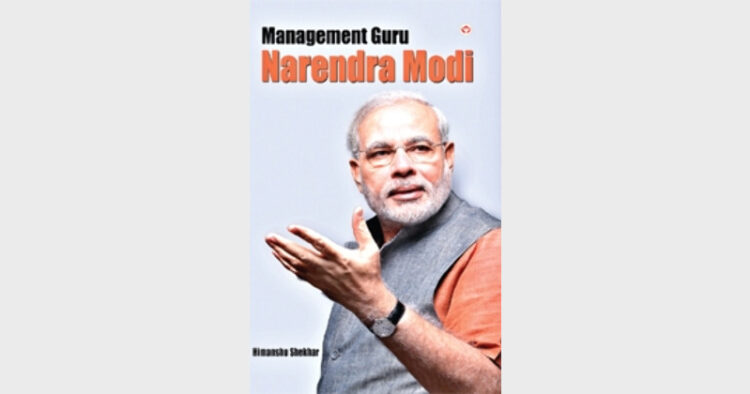Management Guru Narendra Modi, Himanshu Shekhar, Diamond Books, Pp 168, Rs 175.00 |
Intro: India is trying to find its feet under the mentorship of Global Guru, Prime Minister Narendra Modi to become “Ek Bharat, Shreshtha Bharat” in global arena.
The theme of this book under review is that India is trying to find its feet under the mentorship of global guru, Shri Narendra Modi. A number of books on him are already flooding the book market but this one is a tad different as it does not blindly eulogise him, but dares to express doubts on some of his future plans for the country. All this while, with Congress party’s policy of secularism and with the discordant notes struck by different regional parties that had mushroomed in every state, cultural nationalism had taken a backseat. But the elections of 2014 threw up a new leader with a vision of development and growth—a leader named Narendra Modi, whose attributes like connecting with the general public, maintaining a helpful attitude, taking tough decisions for the well-being of the country, ensuring a historic victory for the Bharatiya Janata Party, adopting a humanitarian approach in his political ideology as against the narrow nepotistic one, won him international repute even in a short initial tenure as Prime Minister.
This book under review covers various aspects of Modi’s life and these include his role as a leader, his style of governance and his pet key issues, like social welfare, use of modern technology, ‘Swacch Bharat Abhiyan’ or ‘Clean India’ mission, financial and political management, but its emphasis is essentially on his style of management so that he can establish “Ek Bharat, Shreshtha Bharat” through “Sabka Saath” for “Sabka Vikas”.
The author, a journalist, who started his career with the Hindi daily Jansatta, speaks highly of Modi’s focus on the need for a different infrastructure from the one existing and that is shifting from highways to “i-ways” and optical fibre networks. Cities that were built in the past on river-banks and subsequently along highways are now to be sited on “availability of optical fibre networks and next-generation infrastructure”. Modi has been critical of previous governments which, he says, gave “swarajya (freedom), lekin swarajya nahin de paaye (but could not give good governance). He suggests thinking in terms of “Rashtra Hit, Rashtra Niti” by adopting a four-pronged approach of “Sarva-priya, Sarva-samaavek, Sarva-hitkari and Samaaveshi”.
The author talks highly of Modi’s management skill in taking Gujarat state on the path of progress by giving a boost to industrial and agricultural growth, but also of his appeal to the Indian youth to shun the poison of casteism, communalism and sectarianism and “think and try a ten years’ moratorium to get a society free of all these tensions.” He praises Modi for expressing concern on the rising incidents of rape and suggestion for a change in the parental attitude towards boys by advising them to ask their son “where he is going, why he is going out, who his friends are because after all, a rapist is also somebody’s son, has parents.” He quotes Modi for saying, “As parents, have we ever asked our son as to what he is doing and where he is going?” Finally, he approves of Modi’s concern at the lack of cleanliness in India and suggestion that “if 125 crore countrymen decide not to ever spread filth, then no power in the world can make our village or town dirty.”
Though the author does not present an exhaustive study of Modi’s management skills, he does try to be objective in his assessment when he refers to the latter’s ambitious plan to launch the bullet train. He says that Modi may be firm on his decision over running the first bullet train between Gujarat and Mumbai but “this may not be a prudent one from the political viewpoint.”
Manju Gupta (The reviewer is a senior political analyst and VP of Viplav Communications Pvt Ltd.)














Comments